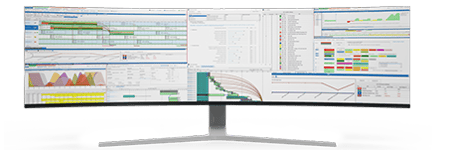Digitalization for Traceability in Medical Manufacturing
In medical manufacturing, traceability isn’t just an advantage—it’s a must. With complex supply chains, stringent regulatory requirements, and the need to ensure the highest quality for end products, traceability is essential for safety, compliance, and operational efficiency. Digitalization is at the heart of enabling this traceability, transforming the way production planners track materials, processes, and final products.
This blog will explore how integrating advanced scheduling solutions like PlanetTogether with ERP systems such as SAP, Oracle, Microsoft, Kinaxis, and Aveva can streamline traceability, allowing production planners to meet regulatory demands and maintain a competitive edge.

Why Traceability Matters in Medical Manufacturing
For production planners in medical manufacturing, traceability is more than a regulatory requirement—it’s a core component of risk management, quality assurance, and product reliability. Traceability provides the following benefits:
Compliance with Regulations: The medical manufacturing industry is governed by strict standards from bodies such as the FDA and ISO. Traceability helps ensure products meet all required specifications and standards.
Quality Control: Effective traceability allows for quick identification of product defects, enabling production planners to trace issues back to specific batches or suppliers. This can reduce the impact of recalls and minimize disruptions.
Supply Chain Transparency: With complete visibility over the supply chain, production planners can make informed decisions about sourcing, production, and logistics.
Enhanced Customer Trust: In a sector where end-users’ health is directly impacted, traceability instills confidence in customers and regulatory bodies alike, as companies can back up their quality claims with data.
The integration of digital scheduling solutions with ERP systems forms the backbone of modern traceability, facilitating real-time visibility across the entire production process.

Digitalization in Enhancing Traceability
Digitalization, through the integration of scheduling software like PlanetTogether with ERP systems, enhances traceability by creating a unified platform for data capture, analysis, and reporting. Here’s how digitalization supports traceability in medical manufacturing:
Data Consolidation: By connecting production schedules with ERP data, digitalization provides a single source of truth, consolidating information on raw materials, production processes, and distribution.
Real-time Monitoring: Digital platforms allow production planners to monitor each step of the production process in real time. This facilitates quick action when issues arise, reducing the time needed for troubleshooting and corrective actions.
Automated Documentation: Maintaining paper-based records can lead to errors and inefficiencies. Digitalization automates documentation, providing detailed records that are easily accessible and reviewable by regulatory bodies.
Enhanced Accuracy: Digital systems reduce the likelihood of human errors and offer precision in tracing products from initial sourcing to final delivery.
Scalability: With the growing complexity of supply chains, digitalization allows traceability systems to scale, ensuring that production planners can maintain visibility as operations expand.
![]()

Leveraging PlanetTogether Integration with Leading ERP Systems for Traceability
Integrating PlanetTogether with ERP systems like SAP, Oracle, Microsoft, Kinaxis, and Aveva can significantly enhance traceability by bringing together production scheduling and enterprise-wide data. Let’s dive into how each of these integrations can drive improvements in traceability for medical manufacturing.
SAP Integration
SAP is a well-established ERP system in medical manufacturing, known for its robust data management capabilities. When integrated with PlanetTogether, SAP provides real-time visibility across the entire supply chain. Production planners can track materials from procurement through production, distribution, and even customer feedback.
Benefits: SAP’s data analytics, combined with PlanetTogether’s scheduling capabilities, enable precise batch tracking and end-to-end traceability. Production planners can access all material and product data within a centralized dashboard, making it easy to generate compliance reports and conduct rapid product recalls if necessary.
Oracle Integration
Oracle’s ERP solutions offer powerful inventory and supply chain management tools, and when integrated with PlanetTogether, they create a seamless environment for traceability. Oracle’s database management strength supports robust data logging, which production planners can leverage to monitor each component’s lifecycle.
Benefits: Integrating Oracle with PlanetTogether enhances the granularity of traceability data, enabling production planners to identify specific suppliers, materials, or batches linked to any given product. This is essential for quickly isolating potential issues, such as contamination in medical supplies, and preventing widespread impacts.
Microsoft Dynamics Integration
Microsoft Dynamics provides a versatile and user-friendly ERP system with extensive compatibility across various software solutions. Integrating PlanetTogether with Microsoft Dynamics allows production planners to leverage cloud-based data storage and real-time analytics, which are especially useful for multi-site operations.
Benefits: For production planners, this integration allows for easy access to real-time data on materials, production stages, and inventory levels. Microsoft Dynamics also supports advanced reporting capabilities, which production planners can use to ensure regulatory compliance with minimal manual effort.
Kinaxis Integration
Kinaxis offers supply chain and demand planning solutions with a focus on rapid response and flexibility. Integrating PlanetTogether with Kinaxis enables production planners to achieve proactive traceability, monitoring supply chain dynamics and potential disruptions in real-time.
Benefits: With Kinaxis, production planners can track components as they move across the supply chain, predicting potential issues and reallocating resources accordingly. This integration enhances responsiveness, which is crucial in a field where quick actions can prevent quality issues from reaching end customers.
Aveva Integration
Aveva specializes in industrial software, often focusing on real-time data for manufacturing. When integrated with PlanetTogether, Aveva’s solutions support enhanced process visibility, allowing production planners to monitor the entire production workflow with precision.
Benefits: Aveva’s real-time data capabilities combined with PlanetTogether’s scheduling features enable production planners to track production conditions, such as temperature and pressure, which are critical in medical manufacturing. This helps ensure that each batch meets strict regulatory and quality standards.

Key Benefits of Digital Traceability for Production Planners
Improved Response to Audits and Inspections: With integrated platforms, production planners can quickly generate detailed reports, showcasing the entire lifecycle of any product. This reduces preparation time for audits and strengthens the facility’s reputation for transparency and compliance.
Enhanced Quality Control: By centralizing data on raw materials, batch production, and distribution, production planners can implement tighter quality controls. In cases where issues are identified, they can easily trace back to the root cause and implement targeted corrective actions.
Reduced Waste and Costs: Digital traceability allows production planners to detect inefficiencies early, whether in sourcing, production, or distribution. This reduces waste, conserves resources, and ultimately lowers operational costs.
Increased Trust and Credibility: When production planners demonstrate thorough traceability processes, it enhances the credibility of the manufacturing facility. This is crucial in medical manufacturing, where patient safety and product reliability are essential.

Challenges and Solutions in Implementing Digital Traceability
Despite the clear benefits, implementing digital traceability through ERP and scheduling integration can present some challenges:
Data Integration Complexity: Integrating multiple systems can be complex, particularly if legacy systems are involved. Working with experienced IT and software professionals is essential to ensure seamless integration.
User Training: Digitalization requires staff to adapt to new systems and processes. Conducting regular training sessions ensures that production planners can fully leverage the system’s capabilities.
Data Security: With an increase in data comes the need for robust cybersecurity measures, especially with sensitive medical manufacturing data. Production planners should work closely with IT to implement strong security protocols.
Cost of Implementation: While there are upfront costs associated with digitalization, the long-term gains in operational efficiency and traceability make the investment worthwhile.
Digitalization is revolutionizing traceability in medical manufacturing, offering production planners unprecedented control and visibility over the production process. Integrating PlanetTogether with powerful ERP systems like SAP, Oracle, Microsoft Dynamics, Kinaxis, and Aveva amplifies these benefits, creating a seamless platform for tracking, quality control, and regulatory compliance.
For production planners in medical manufacturing, this level of traceability isn’t just a value-add; it’s a fundamental requirement for success. By embracing digitalization and robust integrations, production planners can position their facilities to meet the highest standards of safety, efficiency, and quality, ensuring that every product meets the needs of both regulators and end-users.
Are you ready to take your manufacturing operations to the next level? Contact us today to learn more about how PlanetTogether can help you achieve your goals and drive success in your industry.
Topics: PlanetTogether Software, Integrating PlanetTogether, Supply Chain Transparency, Real-Time Monitoring, Medical Manufacturing, Automated Documentation, Ensuring Compliance with Regulations, Data Consolidation, Enhanced Accuracy, Improved Response to Audits and Inspections, Reduced Waste and Costs




















LEAVE A COMMENT